
Enthusiast III
Thanks, I think I will use this as a justification to order a General ARRL Book, I lent my Technician book to a Retired 18E and was debating whether I needed to try to get it back or snag my first copy back from my brother in law

Enthusiast III

Member III
You are correct sir. The fee has actually been $70 for a while now, but the license was just changed to 10yrs among other small changes to FRS/GMRS.In between reading this thread and reading up on various items involving Commo, I did see that the price for the GMRS license is $70 and it is now for 10 years, unless I misread it.

Enthusiast III
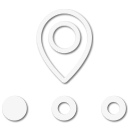
Traveler I

Enthusiast III

Enthusiast III
Welcome to the world of HF.Passed both my Tech and General!
Sent from my iPhone using OB Talk

Enthusiast III
Thanks, now the question is when will I actually have something to get on HF withWelcome to the world of HF.

Enthusiast III
I did the same thing back several years ago. Did Technician and General. I never did buy an HF rig, but lately, I have been getting back into 2m and thinking more about buying an HF rig too. Maybe sometime soon.Thanks, now the question is when will I actually have something to get on HF with
Sent from my iPhone using OB Talk

Enthusiast III

Influencer II

Enthusiast III
Great resources! I've been planning on getting my license and this is really helpful. Thank you for sharing!What Is Ham Radio:
The ARRL describes Amateur Radio as follows:
"Amateur Radio (ham radio) is a popular hobby and service that brings people, electronics and communication together. People use ham radio to talk across town, around the world, or even into space, all without the Internet or cell phones. It's fun, social, educational, and can be a lifeline during times of need.
You can set up a ham radio station anywhere!
On a beach...
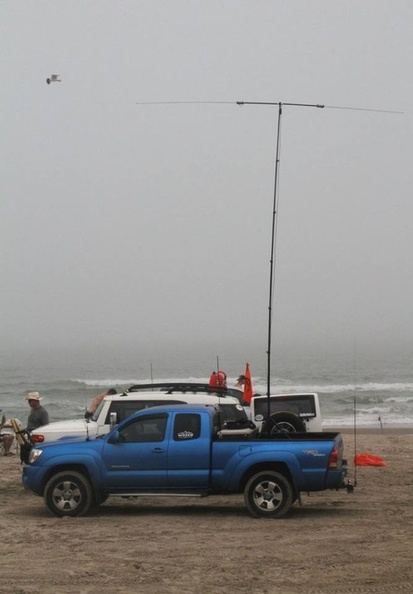
...in your overland rig
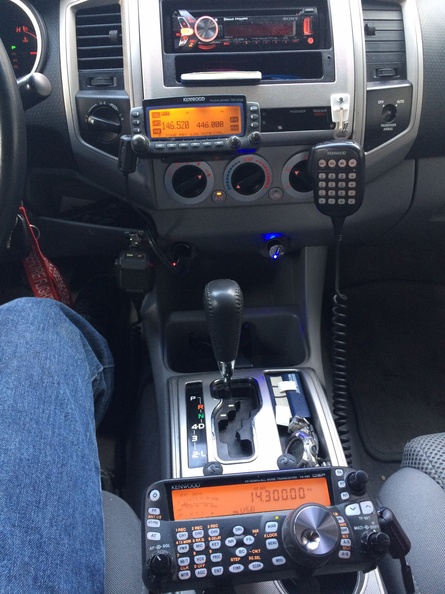
...or at home.

Although Amateur Radio operators get involved for many reasons, they all have in common a basic knowledge of radio technology and operating principles, and pass an examination for the FCC license to operate on radio frequencies known as the "Amateur Bands." These bands are radio frequencies allocated by the Federal Communications Commission (FCC) for use by ham radio operators."
Amateur Radio and Overlanding:
On VHF/UHF Phone (Voice) Communications:
Amateur radio is a natural fit for those who are into remote expeditions or enjoy caravan trips through the wilderness. The radio equipment we use (VHF/UHF) is typically of a far higher quality than typical CB Radios. Also, these radios are usually capable of putting out more than 50 watts of power, compared to a CB limited to 4w. The 2M band being a much shorter wave length means the antennas are physically smaller than CB Antennas, while typically performing at a higher level of gain. This means more clearance for overhangs.
Another advantage of Ham Radio Communications is that the use of Repeaters is possible. A repeater does exactly what it sounds like. It's a Radio and Antenna, typically on a very tall structure (or mountain) that receives your transmission, then re-transmits it from the new location. This can be very helpful in the mountains, where valley-to-valley communications is impossible. Putting a repeater on the top of the mountain in the middle allows you to communicate between those valleys, or out of them.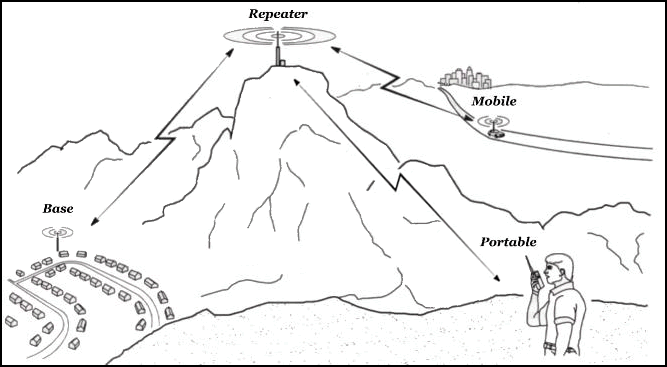 On HF Communications:
On HF Communications:
Once you upgrade to a license class that allows HF privileges, you are then able to take your communications global. During a trip to the southern edge of North Padre Island in Texas I was able to communicate with hams in South Carolina, Tennessee, and Oregon. While this isn't as reliable as a Satellite Phone, or "SPOT," in a pinch, this can still be an effective way of acquiring help in the most remote of areas. If you are 60 miles from the nearest road at the southern most edge of the island in Texas where cell signals are non-existent, and you need help, reaching someone in Wisconsin via HF is still useful because that person in Wisconsin CAN call the ranger station on the telephone and let them know there's someone in distress at the southern most edge of the island.Special Use Cases:
One of the great strengths of Amateur Radio is how flexible the hobby is. One type of operation that is very interesting for the Overlander is called APRS. (Amateur Position Reporting System) APRS takes raw NEMA2 data from a GPS, encodes it, and transmits it over the amateur bands. A simple APRS Transmitter/Receiver can be built by connecting an inexpensive handheld transceiver (around $35 on Amazon) to an Android Phone or Tablet with a GPS, and then installing a $4.95 piece of software called APRSdroid. This APRS site can then simultaneously transmit your coordinates, as well as display the near real-time locations of every other APRS station within receiving distance. Imagine a caravan of five vehicles, each with an small APRSdroid powered APRS system in their vehicles, with the map display turned on.Android Phone, and Baofeng UV-3R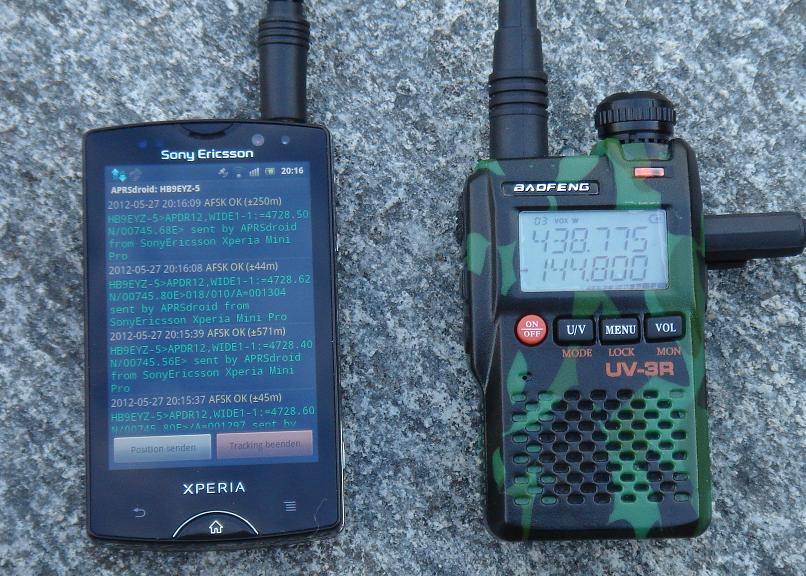 Map Display
Map Display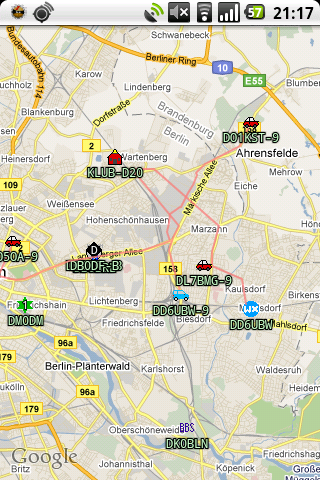
What Are The License Classes:
In the United States there are three classes of Amateur Radio Operator Licenses (Ham)
Each Class license increases your privileges on the air.
- Technician Class
- General Class
- Extra Class
Primarily the Technician Class license is for VHF/UHF communications, which work well for regional contacts. VHF (2M) and UHF (70CM) are the two most common forms of mobile ham radio communications equipment. Simplex these operate line of sight, which is to say 5-10 miles over flat level terrain.
The General Class license opens up 90% of the HF bands for you. These bands work for around-the-world communications, even with low power and modest antennas. As an example, while driving on Hwy 71 in Austin, Texas, I was able to carry on a conversation with a HAM outside Moscow, in Russia.
Finally the Extra Class license gives you the last small piece of the pie. Primarily these are edges of the bands which more closely overlap with other nations band allocations opening up more opportunities to talk to HAMs from other countries.
How Can You Get Licensed:
Ham Radio Clubs across the country offer testing sessions every month. The ARRL (Amateur Radio Relay League) provides a tool to help you locate Amateur Radio License Exams in your area. TEST FINDER
Tests cost around $15 to take. If you pass the Technician the testing site will let you take your General test in the same sitting for free. If you pass your General test, they will let you take the Extra for free in the same sitting. So with proper preparation it is possible to go from unlicensed to Extra in one day.
Once you pass a test, your license is good for 10 years, at which point you renew your license for free. You do not need to take any further tests.
Training/Study Materials:
There are books from Gordon West to help you prepare for the tests. I found Gordon West's teaching style in his AUDIO CD Programs to be very compatible with my learning style.
You can take Practice tests for all three license classes here: QRZ.com (free registration required)
- Technician Book -- Technician Audio Course
- General Book -- General Audio Course
- Extra Book -- Extra Audio Course
Each requires a score of greater than 70% to pass. If you are regularly scoring around 85% on practice tests, you are ready for the real thing!
73 from W9ZEB
Lars

Advocate III
This is awesome. Thank you so much for posting this. I am getting into this now and im excited to utilize all the resources that you have provided!What Is Ham Radio:
The ARRL describes Amateur Radio as follows:
"Amateur Radio (ham radio) is a popular hobby and service that brings people, electronics and communication together. People use ham radio to talk across town, around the world, or even into space, all without the Internet or cell phones. It's fun, social, educational, and can be a lifeline during times of need.
You can set up a ham radio station anywhere!
On a beach...

...in your overland rig

...or at home.

Although Amateur Radio operators get involved for many reasons, they all have in common a basic knowledge of radio technology and operating principles, and pass an examination for the FCC license to operate on radio frequencies known as the "Amateur Bands." These bands are radio frequencies allocated by the Federal Communications Commission (FCC) for use by ham radio operators."
Amateur Radio and Overlanding:
On VHF/UHF Phone (Voice) Communications:
Amateur radio is a natural fit for those who are into remote expeditions or enjoy caravan trips through the wilderness. The radio equipment we use (VHF/UHF) is typically of a far higher quality than typical CB Radios. Also, these radios are usually capable of putting out more than 50 watts of power, compared to a CB limited to 4w. The 2M band being a much shorter wave length means the antennas are physically smaller than CB Antennas, while typically performing at a higher level of gain. This means more clearance for overhangs.
Another advantage of Ham Radio Communications is that the use of Repeaters is possible. A repeater does exactly what it sounds like. It's a Radio and Antenna, typically on a very tall structure (or mountain) that receives your transmission, then re-transmits it from the new location. This can be very helpful in the mountains, where valley-to-valley communications is impossible. Putting a repeater on the top of the mountain in the middle allows you to communicate between those valleys, or out of them.On HF Communications:

Once you upgrade to a license class that allows HF privileges, you are then able to take your communications global. During a trip to the southern edge of North Padre Island in Texas I was able to communicate with hams in South Carolina, Tennessee, and Oregon. While this isn't as reliable as a Satellite Phone, or "SPOT," in a pinch, this can still be an effective way of acquiring help in the most remote of areas. If you are 60 miles from the nearest road at the southern most edge of the island in Texas where cell signals are non-existent, and you need help, reaching someone in Wisconsin via HF is still useful because that person in Wisconsin CAN call the ranger station on the telephone and let them know there's someone in distress at the southern most edge of the island.Special Use Cases:
One of the great strengths of Amateur Radio is how flexible the hobby is. One type of operation that is very interesting for the Overlander is called APRS. (Amateur Position Reporting System) APRS takes raw NEMA2 data from a GPS, encodes it, and transmits it over the amateur bands. A simple APRS Transmitter/Receiver can be built by connecting an inexpensive handheld transceiver (around $35 on Amazon) to an Android Phone or Tablet with a GPS, and then installing a $4.95 piece of software called APRSdroid. This APRS site can then simultaneously transmit your coordinates, as well as display the near real-time locations of every other APRS station within receiving distance. Imagine a caravan of five vehicles, each with an small APRSdroid powered APRS system in their vehicles, with the map display turned on.
Android Phone, and Baofeng UV-3R

Map Display

What Are The License Classes:
In the United States there are three classes of Amateur Radio Operator Licenses (Ham)
Each Class license increases your privileges on the air.
- Technician Class
- General Class
- Extra Class
Primarily the Technician Class license is for VHF/UHF communications, which work well for regional contacts. VHF (2M) and UHF (70CM) are the two most common forms of mobile ham radio communications equipment. Simplex these operate line of sight, which is to say 5-10 miles over flat level terrain.
The General Class license opens up 90% of the HF bands for you. These bands work for around-the-world communications, even with low power and modest antennas. As an example, while driving on Hwy 71 in Austin, Texas, I was able to carry on a conversation with a HAM outside Moscow, in Russia.
Finally the Extra Class license gives you the last small piece of the pie. Primarily these are edges of the bands which more closely overlap with other nations band allocations opening up more opportunities to talk to HAMs from other countries.
How Can You Get Licensed:
Ham Radio Clubs across the country offer testing sessions every month. The ARRL (Amateur Radio Relay League) provides a tool to help you locate Amateur Radio License Exams in your area. TEST FINDER
Tests cost around $15 to take. If you pass the Technician the testing site will let you take your General test in the same sitting for free. If you pass your General test, they will let you take the Extra for free in the same sitting. So with proper preparation it is possible to go from unlicensed to Extra in one day.
Once you pass a test, your license is good for 10 years, at which point you renew your license for free. You do not need to take any further tests.
Training/Study Materials:
There are books from Gordon West to help you prepare for the tests. I found Gordon West's teaching style in his AUDIO CD Programs to be very compatible with my learning style.
You can take Practice tests for all three license classes here: QRZ.com (free registration required)
- Technician Book -- Technician Audio Course
- General Book -- General Audio Course
- Extra Book -- Extra Audio Course
Each requires a score of greater than 70% to pass. If you are regularly scoring around 85% on practice tests, you are ready for the real thing!
73 from W9ZEB
Lars

Enthusiast III

Advocate III
20990
This information is for US only. Looking at the Canadian test pool it covers a lot more information for Basic than our Tech and General class combined... if you weee to study the US tech, General and sections of the Extra, you might be able to use the information for your Basic/Advanced test.I realise that this is a US specific thread but does anyone if this information is usable to study for the Canadian test, I have been having slight difficulties finding easy to read study material that doesn't involve joining a ham club.

Advocate III
20990
This is awesome. Thank you so much for posting this. I am getting into this now and im excited to utilize all the resources that you have provided!
Just a note... since the OP’s post, the test pool has changed for both General and Extra Class licenses and Tech will be changing July 1st 2021. So make sure you look for the most up to date books from Gordon, the ARRL, or where ever you are getting your study materials from. Also there are several YouTubers that push out classes like Ham Radio Crash Course and Ham Radio 2.0.This is awesome. Thank you so much for posting this. I am getting into this now and im excited to utilize all the resources that you have provided!
